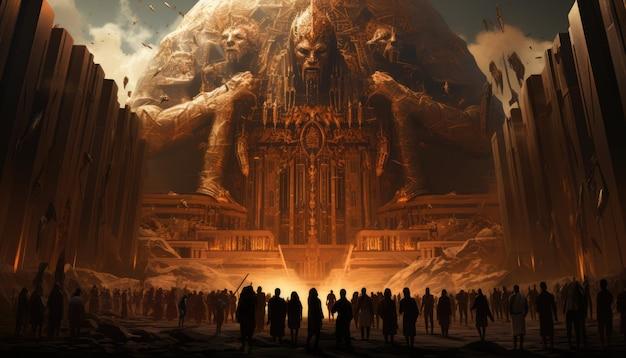In the realm of ancient literature, the Epic of Gilgamesh stands as a timeless masterpiece. Composed over 4,000 years ago in Mesopotamia, this epic poem offers a glimpse into the rich mythology and wisdom of ancient civilizations. But what exactly is the main message of the Epic of Gilgamesh? What themes does it explore? In this blog post, we delve into the heart of this epic, uncovering its profound insights and lessons that still resonate with us today.
As we journey through the narrative, we encounter larger-than-life characters, mythical beasts, and divine interventions. At the core of the tale stands Gilgamesh, the mighty king of Uruk, who embarks on a quest for eternal life after the death of his closest friend, Enkidu. In this pursuit, Gilgamesh confronts his mortality, grapples with existential questions, and ultimately learns invaluable lessons about the importance of acceptance, friendship, and the pursuit of a meaningful legacy.
Join us as we unravel the layers of symbolism and meaning within the Epic of Gilgamesh, exploring the main message, themes, and lessons that continue to resonate with readers across time and cultures.

What is the Main Message in the Epic of Gilgamesh
The Epic of Gilgamesh, an ancient Mesopotamian poem from the third millennium BCE, holds a rich tapestry of themes and messages that still resonate today. Let’s delve into the main message of this epic tale and uncover its timeless wisdom.
The Fragility of Mortal Existence
In the Epic of Gilgamesh, the main message reminds us of the fragility of human life. Through Gilgamesh’s quest for immortality, we are confronted with the reality that death is an inescapable part of the human experience. Despite his great power as a king, Gilgamesh must ultimately come to terms with his own mortality, teaching us the value of cherishing each moment of our existence.
The Power of Friendship
Another significant message conveyed in this epic is the transformative power of true friendship. Gilgamesh’s friendship with Enkidu teaches us that deep connections can shape our lives, provide us with strength, and lend meaning to our endeavors. Their friendship encapsulates the notion that we are stronger together, illuminating the invaluable support and companionship found in close relationships.
The Pursuit of Wisdom and Knowledge
Gilgamesh’s journey also emphasizes the importance of seeking wisdom and knowledge. As he ventures through the trials and tribulations of his quest, we witness his growth from a brash and arrogant ruler into a humbler and wiser individual. This transformation underscores the message that knowledge and understanding are essential for personal development and enlightened leadership.
The Consequences of Hubris
Another key theme in the Epic of Gilgamesh is the repercussions of excessive pride and arrogance, known as hubris. Gilgamesh’s hubris leads him to challenge the gods and seek immortality, only to realize the limits of his power and the futility of his actions. This cautionary message warns us against the dangers of unchecked ego, urging humble introspection and a recognition of our place in the grand scheme of things.
The Cycles of Life and Nature
The epic also encompasses the cyclical nature of life and the changing seasons, reflecting the natural rhythms of existence. By exploring the inevitability of change and the interconnectedness of all things, the Epic of Gilgamesh encourages us to embrace the transient nature of our world, adapt to life’s ebbs and flows, and find solace in the cycles that shape our lives.
In conclusion, the main message of the Epic of Gilgamesh weaves together profound philosophical insights, showcasing the fragility of mortality, the power of friendship, the pursuit of wisdom, the consequences of hubris, and the eternal cycles of life and nature. This ancient epic continues to captivate readers today, teaching us profound lessons about the human condition and the timeless truths that transcend millennia.

Frequently Asked Questions About the Main Message in the Epic of Gilgamesh
What is the main message in the Epic of Gilgamesh
The main message in the Epic of Gilgamesh centers around the universal human experience of mortality and the quest for immortality. It explores the themes of friendship, the dangers of unchecked power, and the search for meaning and purpose in life.
What is the main theme of the epic
The main theme of the Epic of Gilgamesh is the inevitability of death and the importance of cherishing and living a fulfilling life while we have the chance. It reminds us that even the greatest of heroes and kings must face their mortality, and that true greatness lies in how we live and the impact we have on others.
What is Lahmu
Lahmu is a term that appears in Mesopotamian mythology. In the Epic of Gilgamesh, Lahmu refers to a group of deities or primordial beings. They are often associated with chaos, destruction, and the primeval forces of nature.
What is the biggest lesson of Gilgamesh
The biggest lesson of Gilgamesh is that power and fame, although tempting, are not enough to overcome the inevitable fate of death. It teaches us that true fulfillment comes from connecting with others, embracing our humanity, and leaving a lasting legacy through acts of love, compassion, and selflessness.
What is Lahamu the god of
Lahamu, also known as Lahmu, is a deity in Mesopotamian mythology. Lahamu is often depicted as a protective deity associated with fertility and the primordial waters. It represents the natural forces of creation and is considered an important element in the divine hierarchy.
Disclaimer: The content shared here is sourced from available literature on the subject and acknowledges that interpretations of the Epic of Gilgamesh may vary.
